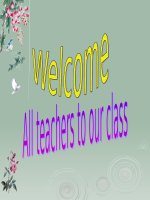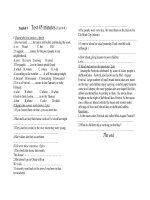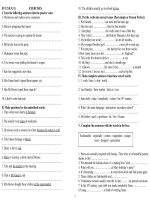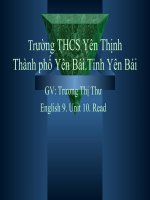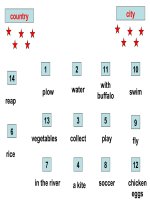English 9 unit 2city life getting stared
Bạn đang xem bản rút gọn của tài liệu. Xem và tải ngay bản đầy đủ của tài liệu tại đây (3.13 MB, 54 trang )
Match the picture with the correct name.
Sydney Opera House
Harbour Bridge
Sydney Harbour
Bondi Beach
Royal Botanical Gardens
Royal National Park
Bondi Beach
Sydney Opera House
Sydney Harbour
Harbour Bridge
Royal Natioanal Park
Royal Botanical Gardens
Natural features
Man-made features
Bondi Beach – Sydney Harbour – Royal National Park
Sydney Harbour House – Harbour – Royal National Gardens
Answer the following questions.
1. What can you see in the picture?
2. Do you know these two boys?
3. Where are they now?
4. What are they talking about?
Duong: Hey, Paul! Over here!
Paul:
Hi, Duong! How's it going? Getting over the jet lag?
Duong: Yes, I slept pretty well last night. Hey, thanks so much for showing me around
today.
Paul:
No worries, it'll be good fun.
Duong: So, are you from around here?
Paul:
Me? Yes, I was born and grew up here. Sydney's my hometown.
Duong: It's fabulous. Is it an ancient city?
Paul:
No, it's not very old, but it's Australia's biggest city, and the history of our
country began here.
Duong: Wow! So what are the greatest attractions in Sydney?
Paul:
Well, its natural features include Sydney Harbour, the Royal National Park,
and Bondi Beach. Man-made attractions such as the Royal Botanic Gardens,
Sydney Opera House, and the Harbour Bridge are also well known to visitors.
Duong: What about transport?
Paul:
Public transport here is convenient and reliable: you can go by bus, by train,
or light rail. Taxis are more expensive, of course.
Duong: And is Sydney good for shopping?
Paul:
Of course! You know, Sydney's a metropolitan and multicultural city, so we
have a great variety of things and foods from different countries. I'll take you
to Paddington Market later, if you like.
Duong: Wonderful. What about education? Are there many universities?
Paul:
Sydney has five big universities and some smaller ones. The oldest of them
was set up in 1850, I believe.
Duong: Oh, it sounds like a good place to get higher education. I like this town!
a. Complete the sentences with information from the conversation.
1. It is Duong's first _________
to Sydney.
visit
2. In Paul's opinion, Sydney is not _________
ancient an city.
3. Sydney Harbour is a _________
natural attraction of Sydney.
4. The shopping is good because of the _________
variety of things.
5. Duong thinks Sydney may be a good place to _________.
study
b. Find the word in the conversation to match these definitions.
1. tiredness from traveling across different tome zones
2. an attraction
3. that can be trusted
4. belonging to a very large city
5. including people of different races, religons, languages,
and traditions
jet lag
a feature
reliable
metropolitan
multicultural
c. Answer the questions.
1. Where did Paul grow up?
- He grew up in Sydney.
2. What is the biggest city in Australia?
- Sydney is.
3. How is the public transport in Sydney?
- It is convenient and reliable.
4. Why is,there a great variety of things and foods in
Sydney?
- Because it is a metropolitan and multicultural city.
5. When was the first university built in Sydney?
- In 1850.
d. Think of other ways to say these expressions from the conversation.
1. "How's it going?"
2. "Getting over the jet lag?"
3. "I slept pretty well"
4. "No worries"
2. Replace the word(s) in italics with one of the words from the box.
crowded –
neighbouring
international
–
local
–
urban
1. There is not a lot of world news in this
newspaper.
2. I do my shopping in the neighbourhood
shops, not in the town centre.
3. At weekends the city centre is always
packed with people.
4. My friend's family has just moved to a
nearby town.
5. There is far too much pollution nowadays
in city areas.
–
international
local
crowded
neighbouring
urban
3. Work in pairs to do the quiz.
CITY QUIZ
1. Which city is the oldest?
A.Ha Noi
B. Hue
C. Can Tho
2. Which city is in Oceania?
A.Baghdad
B. Amsterdam
C. Canberra
3. Which city is the best-known city in North America?
A.Chicago
B. Vancouver
C. New York
4. Which city is in Africa?
A.Luanda
B. Athens
C. Buenos Aires
5. Which city has the World Heritage status?
A.Bac Giang B. Vinh
C. Hoi An
6. Which is a capital city?
A. Rio
B. Moscow
C. Osaka
Teacher: Huynh Phong Dinh
1a. Put one of the adjectives in the box in each blank.
local
helpful
delicious
warm
ancient
fascinating
historic
comfortable
Dear Oggy,
We’re having a fabulous time here in Hoi An. You know, it’s
a(n) (1) __________
ancient town 30 km from Da Nang. The weather is very
comfortable .
(2) __________
warm
and sunny. Our hotel is small but (3) __________
The staff are friendly and (4) __________
helpful
.
We’ve seen most of the sights of the town. The street life here is (5)
fascinating . We’ve spent a lot of time wandering around and
__________
historic
looking at the (6) __________
temples, bridges, and houses. We’ve
also bought a lot of (7) __________
local
souvenirs, crafts, and clothing.
delicious and affordable. I wish
Well the street food in Hoi An is (8) __________
you could be here with us!
Anyway, I hope things are good with you.
Lots of love,
Jack
1b. Now underline all the other adjectivesin the message.
2. Which of the following adjectives describe city life? Put a (√ ).
stressful
populous
exciting
polluted
delicious
cosmopolitan
historic
unemployed
busy
annoying
forbidden
pleased
exhausted
cheerful
modern
easy-going
frightening
downtown
rural
fashionable
3. Put the suitable adjective from 2 in each blank.
fashionable parts of
1. She lives in one of the most ____________
the city: there are lots of luxury shops there.
2. How ____________!
The roads are crowded and I'm
annoying
stuck in a traffic jam.
3. You can't stop here. Parking is ____________
in this
forbidden
street.
cosmopolitan , there are people
4. This city is very ____________
here from all over the world.
5. The gallery downtown has regular exhibitions of
____________
art.
modern
6. Nhieu Loc canal in Ho Chi Minh City is much less
____________
than before.
polluted
Pronunciation: Stress on pronouns in sentences.
Most pronouns have strong and weak forms.
Normally we use the weak form, but if the word
is stressed because it is especially important, or because
we want to show a contrast, we use the strong form.
Example:
A: That looks pretty easy. I think you can do it.
("you" is weak)
B: Well, you do it then! ("you" is strong)
4. Listen and repeat, paying attention to the difference in the underlined
pronouns. Circle the pronouns that sound strong.
1. A:
B:
2. A:
B:
3. A:
B:
4. A:
B:
Can you come and give me a hand?
OK. Wait for me!
Did you come to the party last night?
Yes. But I didn't see you.
Look - it's him!
Where? I can't see him.
They told us to go this way.
Well, they didn't tell us!
5a. Listen and mark the underlined words as W (weak) or S (strong).
Example:
A: Are you going to talk to him (W)?
B: No, I think he (S) should talk to me (S) first.
1.
A: Is he(_)
W there?
B: No. Everybody else is, but he's (_)
S gone home!
2.
A: Do you know that woman?
B: Her(_)?
Er... No. I don't recognise her(_).
S
W
3.
A: I'm afraid we(_)
W can't stay any longer.
B: What do you mean 'we' (_)?
l've (_)
S got plenty of
S
time.
4.
A: Look! Everybody's leaving.
B: What about us(_)?
Shall we(_)
S
W go, too?
5b. Work in pairs. Practise the exchanges above.
Teacher: Huynh Phong Dinh
Comparison of adjectives and adverbs: review
1. Match the beginnings to the correct endings.
A
B
1. It’s not as
a. faster than ever.
2. That skyscraper is one
b. to spell better.
3. The exam was
c. than being stuck in a traffic jam.
4. Life in the past was
d. of the tallest buildings in the world.
5. Mexico City is a lot
e. more difficult than I expected.
6. Kids are growing up
f. simple as it looks!
7. Nothing is worse
g. bigger than Rome.
8. These fun cards will
encourage kids
h. less comfortable than it is now.
Key:
1
2
3
4
5
6
7
8
f
d
e
h
g
a
c
b
Remember!
The Present Perfect
You can use much, a lot, a bit and a little with the comparative forms of
adjectives to show how big the differences are.
Example:
have
to Nha
Trang
twice.films.
A(+)
DVDI is
muchbeen
better than
a video
for watching
(- )the
Hesuperlative
hasn’t been
tothe
Nha
Trang.
With
forms of
adjectives
you can use second, third, etc.
Example:
Karachi
in Pakistan
is thebeen
secondto
largest
in the world in population.
He
has never
Nhacity
Trang.
You
use by
far to
emphasise
(?)can
Have
you
ever
been superlatives.
to Nha Trang?
Example:
China is by far the most populated country in the world.
2. Complete the text with the most
suitable form of the adjectives in brackets.
Add the where necessary.
London is one of (1. large) ___________
the largest cities in the world.
Its population is a lot (2. small) ___________
than Tokyo or
smaller
Shanghai, but it is by far (3. popular) _________________
the most popular
touristdestination. London is probably most famous for its
museums, galleries, palaces, and other sights, but it also
includes a (4. wide) _______________
range of peoples,
wider
cultures, and religions than many other places.
People used to say that it was (5. dirty) ____________
the dirtiest city
too, but it is now much (6. clean) ___________
than it was.
cleaner
To the surprise of many people, it now has some of
(7. good) _____________
restaurants in Europe too. For
the best
some people, this makes London (8. exciting)the
__________
most exciting
city in Europe.
3. Look at the conversation in GETTING STARTED
again. Find and underline the phrasal verbs.
Remember!
The Present Perfect
In addition to learning the meanings of phrasal verbs, we
need to know whether the verb and the particle(s) have
I have
beenor
tothey
Nha can
Trang
twice.
to(+)
stay
together
be separated.
hasn’tphrasal
been toverbs,
Nha Trang.
- (-In) He
these
the parts can never be
separated:
off, look
put up with…
He hasset
never
beenforward
to Nha to,
Trang.
- (?)
In these
parts
can be separated: the
Have phrasal
you eververbs,
been the
to Nha
Trang?
object of the verb can come between the verb and the
particle: put sth on, turn sth/sb down…
4. Underline the correct particle to complete each phrasal verb.
1. The city has recently set up/off/out a library
in the West Suburb.
2. I don't think Fred gets over/through/on with
Daniel. They always argue.
3. You should take your hat in/over/off in the
cinema.
4. Their children have all grown up/out/out of
and left home for the city to work.
5. We were shown up/off/around the town by
a volunteer student.
6. The town council decided to pull
up/over/down the building, as it was unsafe.
4. Underline the phrasal verbs in the sentences, and match
them to their meaning .
remove
refuse
examine
make a note
press the switch
continue doing
1. You don't need the light on in here. Turn it off, press the switch
please.
2. They offered him a place at the company but
refuse
he turned it down.
3. The doctor wanted to go over the test results
examine
with her patient.
4. Once you've finished cleaning, you can go on continue doing
with your work.
remove
5. When you come inside you should take off
your coat and hat.
6. The local meeting is on Oct. 15th. Put it down make a note
in your diary.
6. Read the text and find eight phrasal verbs. Match
each of them with a definition from the box.
consider
discover
ask for (a job)
make progress
arrive
continue
put on smart clothes
make someone feel happier
For her first evening's work at the bar, Sarah dressed up. She wore a
black skirt and white blouse, as she had been told to look smart.
However, when she turned up, she found out that the manager had been
less than honest with her about the job. She had to serve the customers
and also work in the kitchen. Still, she decided to go on working at the
bar for the time being. After all, she was getting on well in the job. Three
months later, she saw an advertisement in the paper for a sales
assistant at a department store. She thought it over carefully, and
decided to apply for it. 'But I won't tell anyone until I've got the new job!'
she thought. The prospect of doing something different cheered her up
considerably.
1. dress up
put on smart clothes
5. get on
make progress
2. turn up
arrive
6. think over
consider
3. find out
discover
7. apply for
ask for (a job)
4. go on
continue
8. cheer up
make someone feel happier
Teacher: Huynh Phong Dinh
1a. Which of the following features do you like
best about a city? Choose three from this list.
1. It is busy and exciting.
2. It is cosmopolitan.
3. It has a lot of fashionable shops.
4. It is cultural.There are cinemas, theatres, galleries,
and museums.
5. It is convenient. There is a good transport system.
6. There are good cafes and restaurants.
7. There are a lot of parks and open space.
8. There are famous buildings and fascinating
neighbourhoods.
1b. Work in groups. Discuss your choices. Give reasons.
I like a busy and exciting city with good
transport, so I can get around and see all
the cultural attractions it has to offer ...
